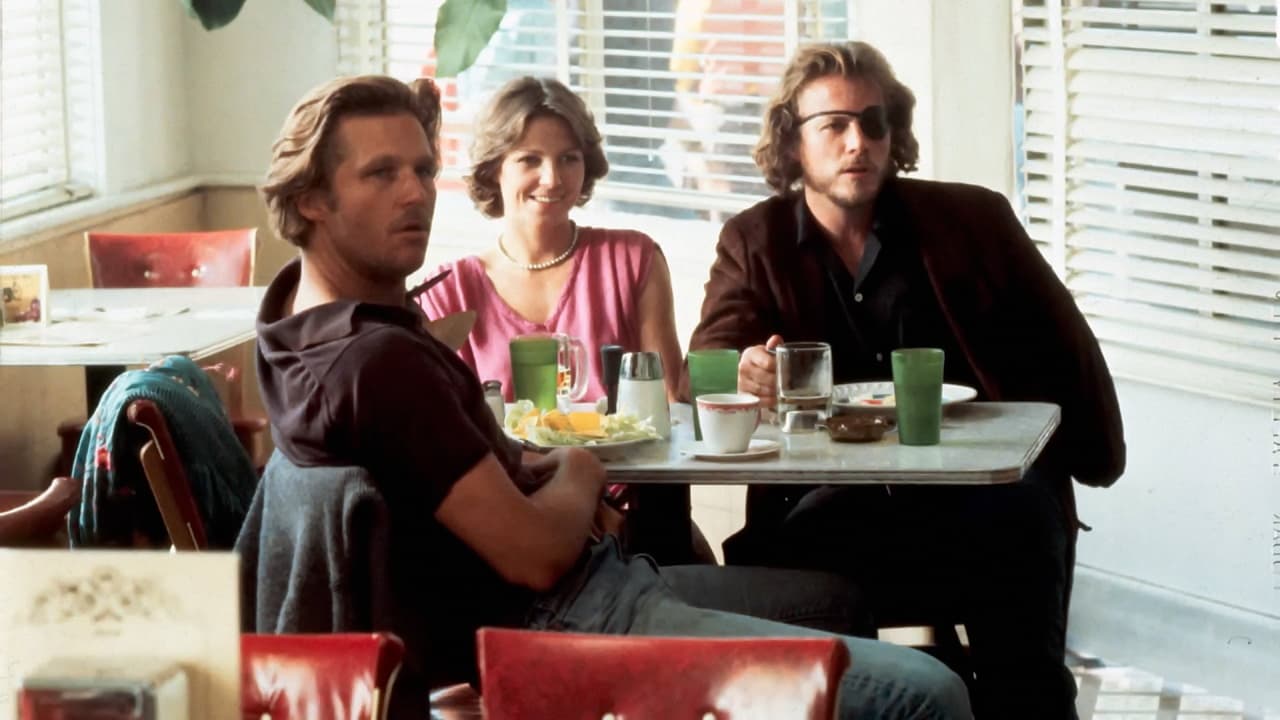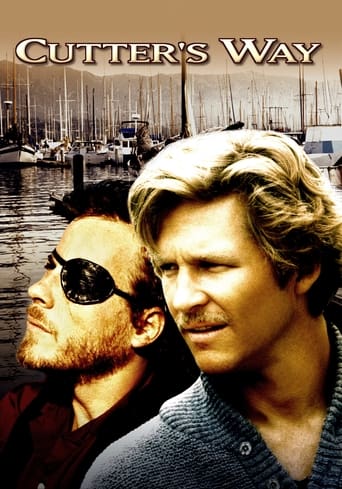

Plot so thin, it passes unnoticed.
... View MoreGood idea lost in the noise
... View MoreThe tone of this movie is interesting -- the stakes are both dramatic and high, but it's balanced with a lot of fun, tongue and cheek dialogue.
... View MoreA film of deceptively outspoken contemporary relevance, this is cinema at its most alert, alarming and alive.
... View MoreCutter's Way is not a perfect film, it meanders at a leisurely pace. The murder mystery is at times a backdrop as we look at a dysfunctional trio living in Santa Barbara in the late 1970s/early 1980s. Parts of the own is still seedy, still a dump. We are yet to enter the excess and glamour of Reaganomics.Jeff Bridges plays gigolo and boat salesman Richard Bone whose car breaks down and he spots another car in the distance and what appears to be a figure dumping something into a large garbage bin. The car later wildly drives past him.The next day a woman's body is discovered and because Bone's car is nearby he is dragged in as a suspect.Alex Cutter is a one eyed, one legged, one armed Vietnam veteran left bitter and twisted after the war. An old buddy of Bone who is one of the few people willing to put up with Cutter's bile and drunken rages. When Bone points out an old wealthy man on a horse during a parade as a potential suspect Cutter is determined to go after his prey and teams up with the dead woman's sister to smoke the culprit out.Lisa Eichhorn is Cutter's abused, alcoholic wife washed out by him even though she loves him. She is the soul of the film as Cutter and Bone go out to catch their whale. She is not afraid to make barbed comments. The film explores the underbelly of America, yet the era is no different than today. Local oil magnate JJ Cord played by Stephen Elliott (famous for the banana sparring routine in Beverly Hills Cop) knows his wealth, influence and penchant for violence will protect him.This was an early performance by the late John Heard and simply one of his best film performances. It is a showy role with allusions to Moby Dick with Cutter as Ahab. Heard should have had a better film career rather than just be known as a careless dad leaving his son, Home Alone twice.Cutter's Way flopped at the box office when it was released. Despite the comments made by director Ivan Passer it is not really a surprise. It is a very anti commercial film that can leave some of its audience frustrated. Over the years it has gained a cult following.
... View MoreCutter's way, aka Cutter and Bone is one of the finest films of the 80's and the finest mystery of that decade. It proves that the salvaged movies are usually treasure of the bunch, and thankfully this movie was saved from oblivion to become a cult classic. One doesn't know where to start with all that works for this cinematic diamond, there are finest performances all around, especially by Heard and Lisa Eichhorn, who mesmerized me with her portrayal of burnt-out wife with loads of existential sorrow and honesty, which she radiates all around her, like a halo, along with beauty from within her troubled soul. The story is well written and the dialogs are great.Czech school of directing always blended well with Hollywood, when Hollywood was about art and not sales, and we have numerous examples of that through the works of Milo Forman, Karel Reisz and finally Ivan Passer. He directs this film with a sense for bringing out the best from each of the principal characters who are all lost souls, wandering through the wasteland of their lives. Jordan Cronenweth's masterful photography that makes this film look 10 years ahead of it's time, only add to the overall beauty. If you can, be sure not to miss this one. Fantastic.
... View More"When I gotta go, I go". "On point, only place to be, Purple Heart land". "Toyota's a shitty car anyway". "What do they call you cats these days anyway"? "Cutter's Way" is perhaps the most quotable movie ever made. John Heard's Cutter is absolutely unforgettable. "The world lacks heroes" is his ultimate statement, and perfectly describes what drives the movie to greatness. Every character in "Cutter's Way" revolves around Cutter and his passionate pursuit of justice. Bone is merely swept along, in this rising tide of enthusiasm. The ending is one of the most genuine conclusions ever put on film. If you only see one DVD. See "Cutter's Way". It is a masterpiece. - MERK
... View MoreThis is what movie making is about. The real essence. Unfortunately most films today focus on just pure entertainment with use of astonishing, mind blocking action and explosion scenes. Movie making is about showing human beings in their life, because mankind itself is so multi layered and a secret in its own. This is mastered in excellence in the movie, the suspense is generated by the characters, a not often seen deep character portrayal. On the fly everyday themes like depression, dolor, friendship and love are addressed, integrated in a thrilling plot, which slowly develops, and culminates in a radical finish. With love and extraordinary detail a really special film from an artist . As conclusion: finest entertainment
... View More